英语易混词语辨析
高考翻译易混淆词辨析

高考翻译易混淆词辨析导语:高考英语翻译常常是考生们心中的痛。
尤其是在词义辨析上,很多同学常常被类似或者相似的单词搞得一头雾水。
为了帮助大家更好地应对高考翻译题,本文将为大家介绍一些易混淆词的辨析,希望能够帮助大家提高翻译能力,取得更好的成绩。
一、常见易混淆词辨析:1. Immigrate与EmigrateImmigrate和Emigrate都表示“移民”的意思,但是它们的使用情境略有不同。
Immigrate多指从一个国家移居到另一个国家,强调的是移动的目的地。
Emigrate多指离开一个国家,强调的是移动的出发地。
例如:His parents immigrated to Canada last year. (他的父母去年移民到加拿大。
)My grandparents emigrated from China when they were young. (我祖父母在年轻时从中国移民出去。
)2. Adverse与AverseAdverse和Averse都表示“反对”的意思,但是它们的用法稍有区别。
Adverse通常用来形容事物和不利的环境,而Averse则用于描述人的态度或意愿。
Adverse在句子中通常是形容词,而Averse通常是形容词或者介词。
例如:She had an adverse reaction to the medication. (她对药物有不良反应。
)I am averse to taking risks. (我不愿意冒险。
)3. Assure、Ensure与InsureAssure、Ensure和Insure都表示“确保”的意思,但是它们的用法略有不同。
Assure常常用来表示向人提供保证或安抚情绪,ensure表示确保某事发生或做好准备,而insure则用于表示购买保险。
例如:I assure you that everything will be fine. (我向你保证一切都会好起来的。
高考高中英语易混淆50组重点词语分类辨析+例句汇总
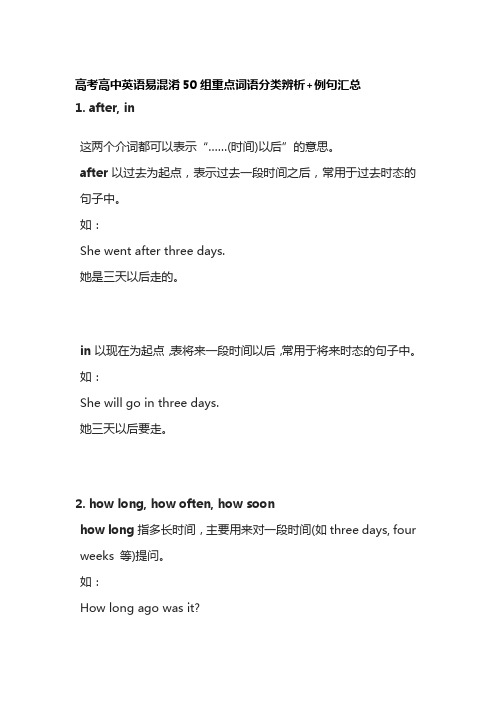
高考高中英语易混淆50组重点词语分类辨析+例句汇总1. after, in这两个介词都可以表示“……(时间)以后”的意思。
after以过去为起点,表示过去一段时间之后,常用于过去时态的句子中。
如:She went after three days.她是三天以后走的。
in以现在为起点,表将来一段时间以后,常用于将来时态的句子中。
如:She will go in three days.她三天以后要走。
2. how long, how often, how soonhow long指多长时间,主要用来对一段时间(如three days, four weeks 等)提问。
如:How long ago was it?这是多久前的事了?how often指每隔多久,主要用来对频率副词或状语(如once a week等)提问。
如:—How often does he come here? —Once a month.他(每隔)多久来一次?每月一次?how soon指再过多久,主要用来对表示将来的一段时间(in an hour, in two weeks 等)提问。
如:How soon can you come?你多快能赶来?3. few, a few, little, a little, several, somefew 和little的意思是否定的,表示“很少”或“几乎没有”;而a few和a little的意思是肯定的,表示“有一些,有一点儿”。
few 和a few修饰可数名词;little 和a little 修饰不可数名词。
several用于修饰可数名词,语意比a few和some更肯定,含有“好几个”的意思。
some可修饰可数名词,也可修饰不可数名词,从数量上说,它有时相当于a few 或a little,有时指更多一些的数量。
4. the other, anotherthe other指两个人或事物中的“另一个”,表示特指。
英语中考牢记20组易混易错词语辨析
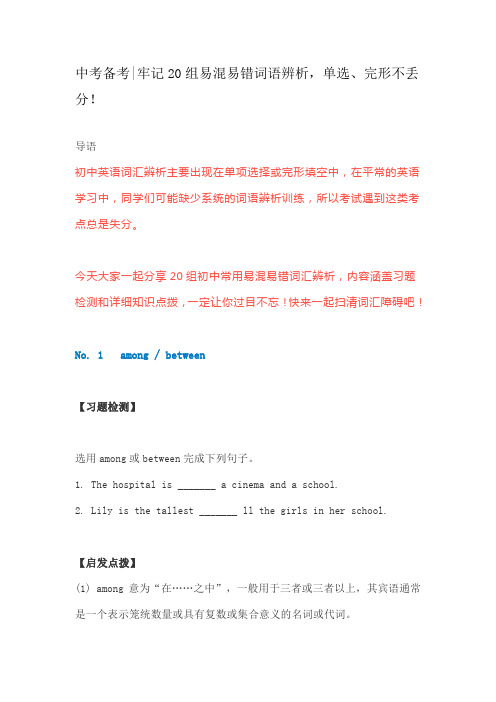
中考备考|牢记20组易混易错词语辨析,单选、完形不丢分!导语初中英语词汇辨析主要出现在单项选择或完形填空中,在平常的英语学习中,同学们可能缺少系统的词语辨析训练,所以考试遇到这类考点总是失分。
今天大家一起分享20组初中常用易混易错词汇辨析,内容涵盖习题检测和详细知识点拨,一定让你过目不忘!快来一起扫清词汇障碍吧!No. 1 among / between【习题检测】选用among或between完成下列句子。
1. The hospital is _______ a cinema and a school.2. Lily is the tallest _______ ll the girls in her school.【启发点拨】(1) among意为“在……之中”,一般用于三者或三者以上,其宾语通常是一个表示笼统数量或具有复数或集合意义的名词或代词。
(2) between一般指两者之间,其宾语通常是表示两者概念的名词或代词,或由and连接的两个具体的人或物。
between有时也可表示多者之中的“两两之间”。
如:Switzerland lies between France, Germany, Austria and Italy.Key:1. between2. amongNo. 2 lay / lie【习题检测】用lay或lie的适当形式完成句子。
1. I _______ the table when my mother cooked the meal.2. John was ill and _______ in bed all morning.【启发点拨】(1) lay作动词,可意为“摆放(餐桌)”,其过去式与过去分词均为laid,现在分词为laying,常用于短语lay the table,意为“摆放餐桌”。
如:Tom was laying the table.(2) lie作动词,意为“躺;平躺”时,过去式为lay,过去分词为lain,现在分词为lying。
易混词语的辨析
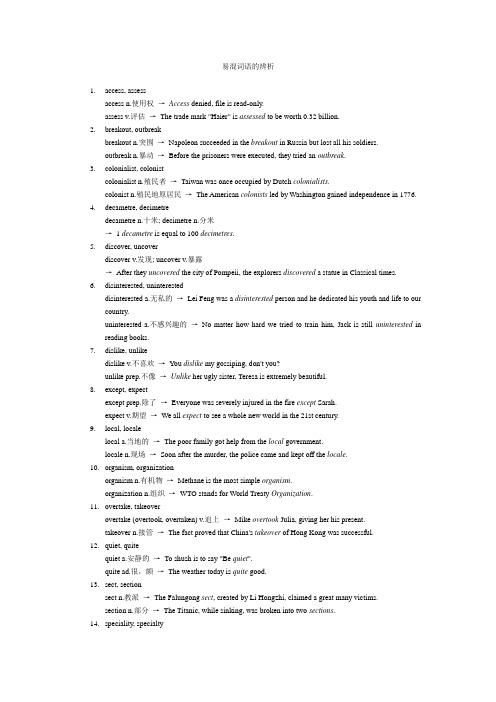
易混词语的辨析1.access, assessaccess n.使用权→Access denied, file is read-only.assess v.评估→The trade mark "Haier" is assessed to be worth 0.32 billion.2.breakout, outbreakbreakout n.突围→Napoleon succeeded in the breakout in Russia but lost all his soldiers.outbreak n.暴动→Before the prisoners were executed, they tried an outbreak.3.colonialist, colonistcolonialist n.殖民者→Taiwan was once occupied by Dutch colonialists.colonist n.殖民地原居民→The American colonists led by Washington gained independence in 1776.4.decametre, decimetredecametre n.十米; decimetre n.分米→ 1 decametre is equal to 100 decimetres.5.discover, uncoverdiscover v.发现; uncover v.暴露→After they uncovered the city of Pompeii, the explorers discovered a statue in Classical times.6.disinterested, uninteresteddisinterested a.无私的→Lei Feng was a disinterested person and he dedicated his youth and life to our country.uninterested a.不感兴趣的→No matter how hard we tried to train him, Jack is still uninterested in reading books.7.dislike, unlikedislike v.不喜欢→You dislike my gossiping, don't you?unlike prep.不像→Unlike her ugly sister, Teresa is extremely beautiful.8.except, expectexcept prep.除了→Everyone was severely injured in the fire except Sarah.expect v.期望→We all expect to see a whole new world in the 21st century.9.local, localelocal a.当地的→The poor family got help from the local government.locale n.现场→Soon after the murder, the police came and kept off the locale.anism, organizationorganism n.有机物→Methane is the most simple organism.organization n.组织→WTO stands for World Treaty Organization.11.overtake, takeoverovertake (overtook, overtaken) v.追上→Mike overtook Julia, giving her his present.takeover n.接管→The fact proved that China's takeover of Hong Kong was successful.12.quiet, quitequiet a.安静的→To shush is to say "Be quiet".quite ad.很,颇→The weather today is quite good.13.sect, sectionsect n.教派→The Falungong sect, created by Li Hongzhi, claimed a great many victims.section n.部分→The Titanic, while sinking, was broken into two sections.14.speciality, specialtyspeciality n.特性→Turning blue with iodine is the speciality of the starch.specialty n.特长,专长→His specialty at football led him to the national team.15.strike, strokestrike (struck, struck) v.打击,敲钟; stroke n.钟鸣声→The clock should have struck 6 but I heard 7 strokes.。
Units7-9易混词语辨析
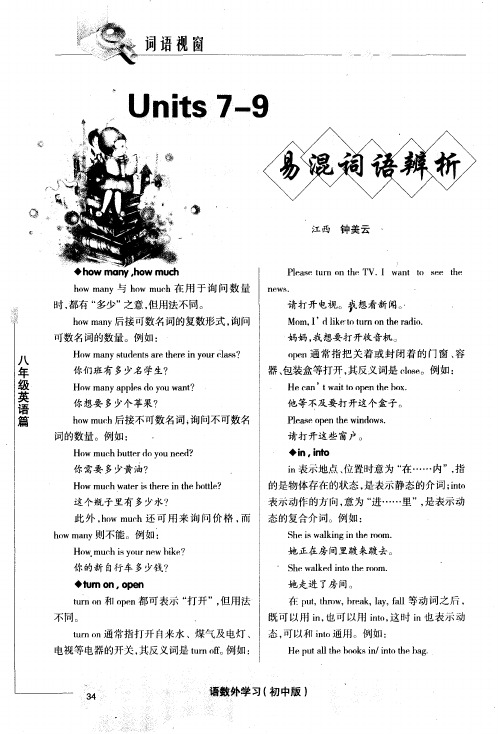
— —
8 Moh ri se p. u’d b t rn t . te sa le Yo et o e
妈 妈 , 想要 打 开收 音 机 。 我
o e 常指 把关 着 或封 闭着 的 门窗 、 pn通 容
器、 包装盒等打开 , 反义词是 c s。例如 : 其 le o
Hec l’ al twat1 p n teb x i oo e h o .
他等不及要 打开这个盒子。
P e s p n tewi d ws la eo e n o . h
t eTV . h
9 ~
— —
t elg t n a ac t nt efo r h ih ds w a h lo . a o
c) i it填空 。 用 n或 n o
1 . ihlv 0 Fs e i
一 一
t ewae . h tr t eca s h ls-
一
o a g sd r n e owen e o h aa e dfrtes ld?
你得到礼物 了吗?
码 re e. miki e ei ega s l t r t ls ? sh nh
5一 .
— —
Haf l.
B) tr 或 o e 用 uno n pn填空。
她 正在房 间里踱 来踱去。
S ewak di t h o . h l e n0tem m ’
她走进 了房 间。
在 ptt o , r k l ,a 等动 词之后 , u,h w be ,a fl r a y l
易混易错词语辨析
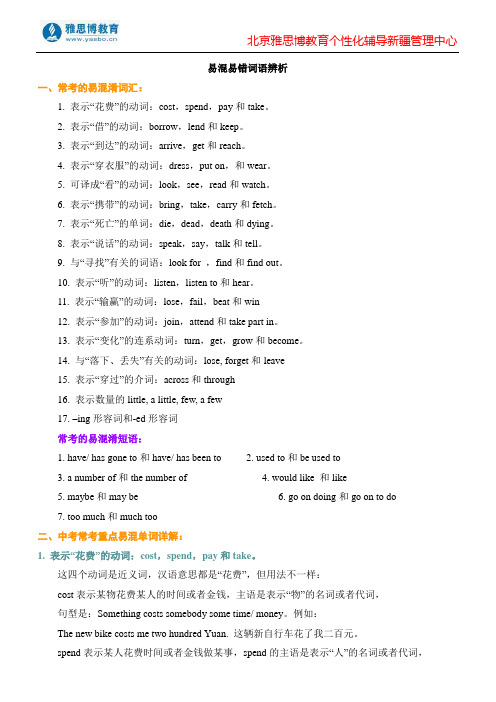
易混易错词语辨析一、常考的易混淆词汇:1. 表示―花费‖的动词:cost,spend,pay和take。
2. 表示―借‖的动词:borrow,lend和keep。
3. 表示―到达‖的动词:arrive,get和reach。
4. 表示―穿衣服‖的动词:dress,put on,和wear。
5. 可译成―看‖的动词:look,see,read和watch。
6. 表示―携带‖的动词:bring,take,carry和fetch。
7. 表示―死亡‖的单词:die,dead,death和dying。
8. 表示―说话‖的动词:speak,say,talk和tell。
9. 与―寻找‖有关的词语:look for ,find和find out。
10. 表示―听‖的动词:listen,listen to和hear。
11. 表示―输赢‖的动词:lose,fail,beat和win12. 表示―参加‖的动词:join,attend和take part in。
13. 表示―变化‖的连系动词:turn,get,grow和become。
14. 与―落下、丢失‖有关的动词:lose, forget和leave15. 表示―穿过‖的介词:across和through16. 表示数量的little, a little, few, a few17. –ing形容词和-ed形容词常考的易混淆短语:1. have/ has gone to和have/ has been to2. used to和be used to3. a number of和the number of4. would like 和like5. maybe和may be6. go on doing和go on to do7. too much和much too二、中考常考重点易混单词详解:1. 表示“花费”的动词:cost,spend,pay和take。
这四个动词是近义词,汉语意思都是―花费‖,但用法不一样:cost表示某物花费某人的时间或者金钱,主语是表示―物‖的名词或者代词,句型是:Something costs somebody some time/ money。
Modules 1-3 易混词语辨析
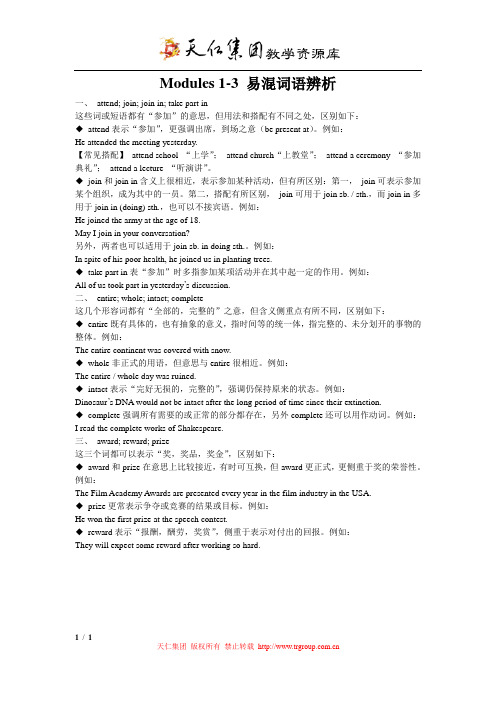
Modules 1-3 易混词语辨析一、attend; join; join in; take part in这些词或短语都有“参加”的意思,但用法和搭配有不同之处,区别如下:◆attend表示“参加”,更强调出席,到场之意(be present at)。
例如:He attended the meeting yesterday.【常见搭配】attend school “上学”;attend church“上教堂”;attend a ceremony “参加典礼”;attend a lecture “听演讲”。
◆join和join in含义上很相近,表示参加某种活动,但有所区别:第一,join可表示参加某个组织,成为其中的一员。
第二,搭配有所区别,join可用于join sb. / sth.,而join in多用于join in (doing) sth.,也可以不接宾语。
例如:He joined the army at the age of 18.May I join in your conversation?另外,两者也可以适用于join sb. in doing sth.。
例如:In spite of his poor health, he joined us in planting trees.◆take part in表“参加”时多指参加某项活动并在其中起一定的作用。
例如:All of us took part in yesterday’s discussion.二、entire; whole; intact; complete这几个形容词都有“全部的,完整的”之意,但含义侧重点有所不同,区别如下:◆entire既有具体的,也有抽象的意义,指时间等的统一体,指完整的、未分划开的事物的整体。
例如:The entire continent was covered with snow.◆whole非正式的用语,但意思与entire很相近。
(简单易混词)英语相似词语辨析ing

英语相似词语辨析第一刊第一部分1.a/an This is a banana.这是香蕉。
That's an apple.那是苹果。
<辨析> a 用在以辅音音素开头的词前,an 用在以元音音素开头的词前。
这里所说的是音素,而不是字母。
注意:1) 书写以辅音字母开头,发音以元音音素开头的单词前面用an .如:an hour 一小时;an honest girl 一个诚实的女孩.辅音字母f,h,l,m,n,r,s,x 单独使用时因它们的发音都分别以元音开头其前面用an 。
如:an"l",一个"l"。
2)书写以元音字母开头发音以辅音音素开头的单词前面用 a 。
如:a useful bood 一本有用的书。
2.a/oneThere is a glass on the table.桌上有只玻璃杯。
There is one glass on the table.桌上有一只玻璃杯。
<辨析> 不定冠词a 和数词one 都可以修饰单数可数名词,表示“一”或“一个”。
a 着重指类别,表示同类事物中的任何一个,有泛指的意义,不一定要译出。
one着重指数量,是与two,three等数词相对而言的。
试比较:I have a pen.(意即我有的是笔,不是其它什么东西。
)I have one pen.(意即我有一枝笔,不是两枝,三枝。
)a 和one 还有如下异同:1)表示“每一”含义时,用a 不用one 。
如:We have five English classes a week.我们每周上五节英语课。
I drink tea three times a day.我一天喝三次茶。
2)表示编号时,用one 不用a 。
如:Are you in Grade One? 你在一年级吗?3)在“一”和其它数量词接连出现时,两者可互换,但表示强调对比时,用one 不用a 。
- 1、下载文档前请自行甄别文档内容的完整性,平台不提供额外的编辑、内容补充、找答案等附加服务。
- 2、"仅部分预览"的文档,不可在线预览部分如存在完整性等问题,可反馈申请退款(可完整预览的文档不适用该条件!)。
- 3、如文档侵犯您的权益,请联系客服反馈,我们会尽快为您处理(人工客服工作时间:9:00-18:30)。
英语易混词语辨析
1.some一般用于肯定的陈述句中,any多用于否认句、疑问句或条件句中。
两者都可修饰可数名词,也可修饰不可数名词。
例如:There is some water in the cup.
Do you have any friends in Shanghai?
If you have any help, let me know.
2.在疑问句中有时也用some,表示希望得到肯定的答复或表示请求、建议、命令等含义。
例如:Would you like some more tea?
3.any也可以用在肯定陈述句中或条件状语从句中,表示任何的、任何一个的,其后接名词单数形式。
例如:Jim runs faster than any other student in his class.
1.few, a few修饰可数名词复数形式,little, a little 修饰不可数名词。
2.a few,a little有肯定含义,译作有几个,有一点;而few 和little表否认,译作没有几个,没有多少。
many, much和a lot of/lots of
都是许多的意思,many后接可数名词复数形式,much后接不可数名词,a lot of/lots of后接可数名词复数形式或不可数名词都可以。
each对两个或两个以上的人或物而言,侧重于个体,且可单独作主语、宾语等;every是对三个或三个以上的人或事物而言,侧重整体情况,且不能单独使用,只能做修饰词。
